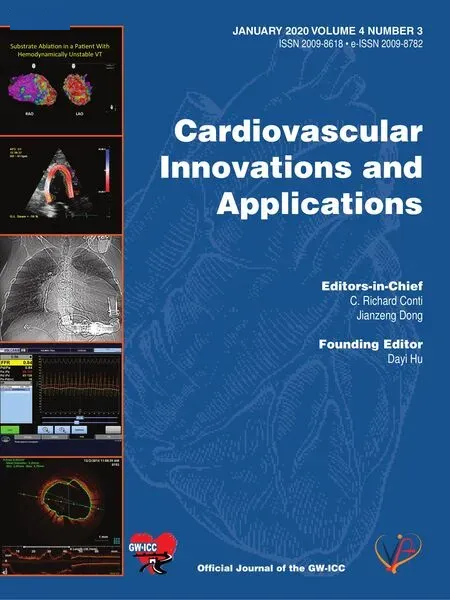Physicians Leaving an Academic Position for Private Practice
C.Richard Conti,MD,MACC
1 University of Florida Medical School,Gainesville,FL,USA
lntroduction
When interviewing a medical resident for a potential fellowship in Cardiovascular medicine,the majority of candidates indicate an interest in academic cardiology.However,few opt for an academic career and many decide during fellowship that private practice is best for them.I have no problem with that decision.The focus of this manuscript in on those who opt for an academic career and for several reasons decide,after a few years,to leave the academic program and often leave gaping holes in the multiple aspects of the program,that require attention of the chief of cardiology.
One of the things that I disliked during my ser -vice as chief of cardiology at the University of Florida was having a faculty person decide to go into private practice.I recognize that some physicians are not suited for an academic position and they need to do what is appropriate for them.If that same individual was recruited to another academic position at another medical school,(usually at a higher academic rank,or even to a School with a better reputation),it didn ’ t bother me,as much since I thought this was something that we should be doing.
Reasons for Leaving an Academic Program
1.“ Money ”T;here is no question that the individual that leaves an academic job for a private practice job makes more money than those that stay in an academic position,but in general they do not factor in,how much money it will cost to remain a member of the practice group,i.e.the overhead.
2.Cost of private practice;the cost of the practice frequently amounts to a fair amount of money and includes payment for malpractice insurance,health insurance,membership dues,etc.In addition,private practitioners need to remember that they need to tie income to seeing patients.In other words,time away from patient care equals money lost.This is usually not the case in an academic position,since one usually receives a salary,tied to clinical responsibilities.
3.“ Much easier to get things done ”.This is not true.A current faculty person who was with us many years ago as a faculty person and then went into private practice and is now back with us tells me that it is just as diff cult to get things done in a private practice situation as it is in a university position.
4.“ Lviing near family ”.I personally think this is a bogus reason and usually related to what the spouse wants and not necessarily what the faculty person wants.I am not buying this reason since in these days of rapid transit,this reason does not stand up since no one spends weeks or weekends with their mother and father or other relatives,even those of us who have family nearby.We may spend time with them at the beach or some resort or cruise but that does not require living close by.
Responsibilities of the Patient’ s Physician
A person going into private practice has no teaching or writing responsibilities.Their responsibility is to take care of the patient,which is fine,but we in academic positions also have that same responsibility and many of our patients are more complex than those seen in private practice.In fact,many of our patients (not all) are referred to us by private practitioners who want our advice for their patient.In addition,we have the responsibility to teach trainees and colleagues and write about what we do.
Subspecialization
Colleagues in private practice are not as specialized as those who are in academic cardiology positions.For example,those in private practice are usually responsible for performing multiple tasks,i.e.interventional cardiology,echocardiography,nuclear studies,etc.
Thus they are not expert in all areas e.g.an interventionalist is usually not expert in echocardiography and vice versa.The same is true for academic positions but the academic cardiologist is truly an expert in what they do because that is usually the only thing they do,and they rely on other academic experts,within the academic section,to provide appropriate consultation if the medical concern is not in their f eld of expertise,e.g.an electrophysiologist want an opinion of an interventional cardiologist.
Writing and Teaching
Since the individual in private practice has no writing or teaching responsibilities there is very little intellectual discussion at conferences about patient ’ s problems as there are in an academic institution.
Residency Programs
A few major hospitals now are trying to develop residency programs to help with the clinical duties.Unfortunately most of these residents are not well trained and know very little about medicine and their mentors are not in the mode of providing intellectual guidance,since they have a private practice to attend to.
National Recognition
The key to being somebody and staying in academic medicine is motivation.Most private practitioners are beloved by their patients and are well known by local colleagues but very few colleagues,nationally or internationally,have any idea of who they are.Thus they are and remain national nobodies.That is not true of academic cardiologists who stay in the medical school and continue to function in their specialty.
I have frequently said to our medical students,house staff and fellows in training that they need to write about what they do,if they want national or international recognition.However,despite encouragement,few opt for an academic career and many decide during fellowship that private practice is best for them.I have no problem with that decision,but I do have a problem with faculty leaving for private practice.
 Cardiovascular Innovations and Applications2020年1期
Cardiovascular Innovations and Applications2020年1期
- Cardiovascular Innovations and Applications的其它文章
- Randomized Clinical Trials:Failure to Enter Patients
- Function of the Right Ventricle
- Associations between Vaspin Levels and Coronary Artery Disease
- Serum lrisin:Pathogenesis and Clinical Research in Cardiovascular Diseases
- Does Coronary Microvascular Spasm Exist? Objective Evidence from lntracoronary Doppler Flow Measurements During Acetylcholine Testing
- A Giant Right Atrial Myxoma with Blood Supply from the Left and Right Coronary Arteries:Once in a Blue Moon
